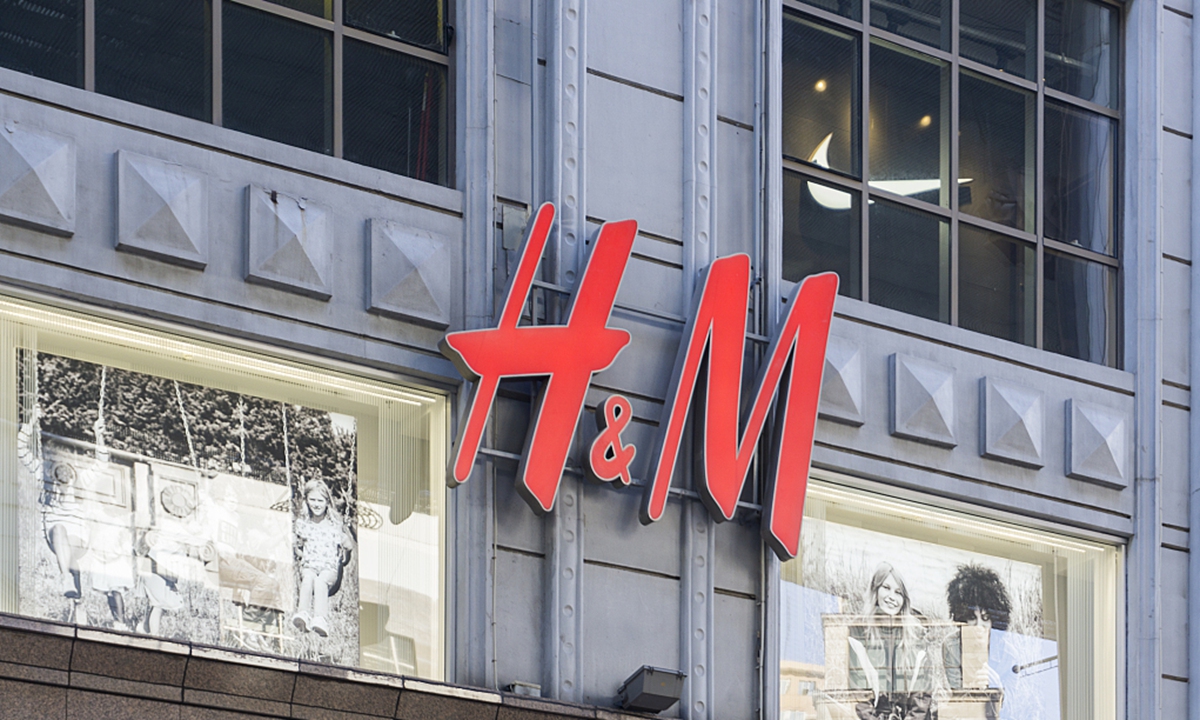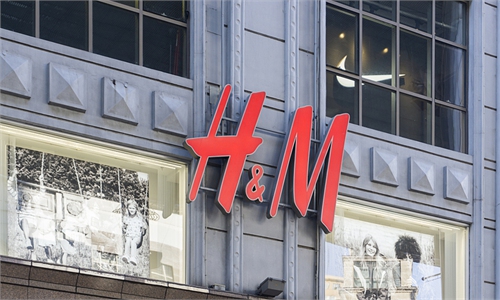
H&M. Photo: VCG
Chinese netizens call for fashion retailer H&M "get out of Chinese market" after it came to light that the company said it has prohibited any type of "forced labor" in its supply chain in Xinjiang, citing so called human right concerns.
One example is that Sina Weibo user "ShangdiZhiying_5zn" Tuesday posted a screenshot of a statement announced by Sweden's H&M, the world's second-biggest fashion retailer, saying that "the company had officially announced to stop using products from Northwest China's Xinjiang Uygur Autonomous Region."
The Sina Weibo user has 2.37 million followers, and the followers made nearly about 1,700 comments on the post.
Comments including "calling H&M quit Chinese market now " and "the company's clothes sucks, and I will no longer buy" winning the most likes.
One netizen said the company holding such a stance in supporting "human right" in Xinjiang, but on the other hand they abandon the products made in Xinjiang, and if they are intent to wreck the local economy? Another netizen said, "then you can leave China as quickly as you can."
Angry netizens went to the official Weibo account of H&M to show their outrage, including comments such as "'I heard that you are boycotting Chinese cotton, then I will boycott your products" reflecting consumer dissatisfaction with the announcement.
Huang Xuan Studio issued a statement on Wednesday, saying that the actor Huang Xuan and H&M have terminated cooperation. Huang and his team firmly oppose any attempt to discredit China and human rights in any form.
In April 2020, H&M announced that Huang had become the brand's ambassador for its menswear collection in China.
The statement of H&M, said last year that it is deeply concerned by reports from civil society organizations and media that include accusations of forced labor and discrimination of ethno-religious minorities in Xinjiang, they strictly prohibit any type of forced labor in the supply chain, regardless of the country or region.
The company said if they discover and verify a case of forced labor at a supplier we work with, they will take immediate action and, as an ultimate consequence, look to terminate the business relationship.
Although the statement has been on its official website for a long time, it has triggered another round of attention as EU recently made sanctions over Xinjiang affairs, sending a strong signal of meddling in Chinese internal affairs.
The Council of the European Union announced on Monday that it will impose restrictive measures on four Chinese nationals and one entity, as a reaction to the alleged mistreatment by China of its minority Uygur population in Xinjiang, including some senior officials of the 13th People's Congress of the Xinjiang Uygur Autonomous Region and of the Xinjiang Production and Construction Corps.
China then hit back with countermeasures by sanctioning 10 individuals and four entities that have spread rumors and lies about Xinjiang.
China's Ministry of Foreign Affairs also refuted allegations of "forced labor" in Northwest China's Xinjiang Uygur Autonomous Region's cotton production again, pointing out the report was fabricated by infamous anti-China "scholar" Adrian Zenz.
"We have iterated our stance on so-called forced labor many times and I can reiterate that Chinese nationals sign labor contracts with employers and obtain remuneration on the basis of equality, voluntariness and consensus in line with the Labor Law and the Labor Contract Law," ministry spokesperson Wang Wenbin said at a routine press conference, noting there is no such thing as "forced labor" as some people with ulterior motives have claimed.
The political tit-for-tat also triggered more support from the public, and market watchers said such resist on the firm may cast shadow on the market performance in China.
H&M, whose full December-February earnings report is due on March 31, is bracing for a loss in the quarter after the pandemic slashed 2020 profits by 88 percent, according to Reuters.
Since March of 2020, there have been reports of store closures in some cities, but, compared with the sluggish sales in other markets, Chinese market demand remains a safe bet for the company.
Global Times

